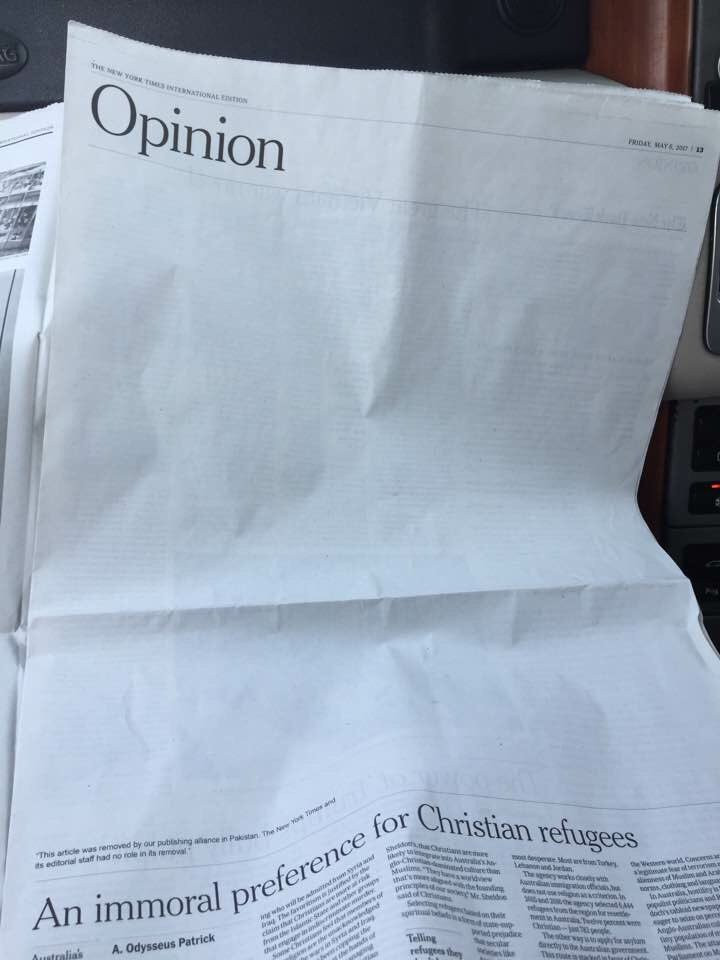Pakistan newspaper replaces NYT article criticising army with blank space
The article titled Pakistan's Triangle of Hate was censored in the Express Tribune, which has an arrangement with the global edition of NYT.
An opinion piece by the New York Times (NYT) criticising the Pakistani army was replaced with a blank space in a local newspaper in Pakistan. It was apparently removed by the Express Tribune that has a partnership to distribute the global edition of NYT.
An image of the opinion page – with a large blank space where the NYT article should have appeared – was widely circulated and trending on Pakistan social media by Friday (5 May) afternoon.
The article titled Pakistan's Triangle of Hate was written by Mohammed Hanif, a high-profile satirist and novelist. His write-up of Pakistani society regularly features in the NYT.
In the article, Hanif brutally criticises the Pakistani military for parading a former Taliban spokesman in front of television cameras to claim that the militants are financially supported by India, the country's arch-rival.
"With his appearance [former Pakistani Taliban spokesperson Ehsanullah Ehsan], the Pakistani Army seemed to be sending this message: You can kill thousands of Pakistanis, but if you later testify that you hate India as much as we do, everything will be forgiven," Hanif's article reads.

The writer, who calls India as Pakistan's "forever existential enemy", also asks: "Do we really need to enlist our children's killers in our campaign against India?"
The former Taliban spokesman Hanif refers to in his article was the one who claimed responsibility on behalf of his militant group for shooting Malala Yousafzai in Swat Valley in 2012. Ehsan also claimed responsibility for the Peshawar school attack, the deadliest ever militant attack in Pakistan, in which more than 150 people, mostly children, were killed.
This is not the first time a newspaper in Pakistan has left a large blank space as the country takes serious offence especially when someone speaks out against its powerful military establishment.
NYT op-ed by @mohammedhanif censored in today's Express Tribune. I wonder if it's "their" order or an internal decision. pic.twitter.com/VomuL2zUKy
— Umer Ali (@IamUmer1) May 5, 2017
The Express Tribune clarified the decision to censor Hanif's article saying NYT had "no role in its removal".
"While we understand that our publishing partners are sometimes faced with local pressures, we regret and condemn any censorship of our journalism," a spokeswoman for NYT told the AFP news agency.
Social media users hinted at the hand of the powerful Pakistani army behind the decision.
Social media users also quickly pointed out that censorship of Hanif's article was the second time that the Express Tribune has blanked out a write-up in recent days. Earlier on Thursday (4 May), the paper had blanked out another NYT article on "Chechnya's anti-gay pogrom".
Earlier, the Pakistani paper had censored an NYT image of two Chinese men kissing on the cover page of its international edition in January 2016. The news was about a Chinese court accepting a same-sex marriage lawsuit in the mainland.
In 2014, an NYT report about Islamabad's knowledge of al-Qaeda leader Osama bin Laden's last hiding place was also replaced with a blank space.
Most serene thing @mohammedhanif has ever written. His own writing left him speechless. https://t.co/zdlpFGIjkk
— Hasan Zaidi (@hyzaidi) May 5, 2017
© Copyright IBTimes 2025. All rights reserved.



















